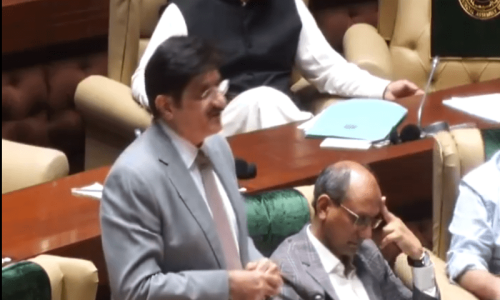KARACHI: Four suspected militants linked with the banned Lashkar-i-Jhangvi who were recently arrested by the police’s Counter-Terrorism Department in the city on charges of collecting funds for the banned outfit to carry out acts of terrorism have made startling disclosures during the initial investigations, it emerged on Tuesday.
Two of them are highly qualified and one of them has worked in a foreign firm, said officials privy to the interrogation of the held suspects.
As per the initial probe, one of the suspects, Muzammil Habib, has studied in a famous college in Karachi and did his BE (electrical) from a prestigious university in Rawalpindi.
Two of the suspects are highly qualified; one worked in a foreign firm
Subsequently, he started working in a foreign firm at a monthly salary of Rs85,000.
Muzammil, a resident of North Nazimabad, informed the interrogators that he was influenced by a close relative of his, who subsequently joined the banned militant Islamic State group and recently shifted to Afghanistan with his family.
Another held suspect, Mohammed Hafeez, told the CTD interrogators that he had learnt the Quran by heart from a Nazimabad school and later on got admission to a famous seminary, where he was doing scholar’s course.
He was influenced by a mufti, who was his neighbour in Nazimabad and later on shifted to Malaysia for “some business purpose”.
He has got training from Afghanistan where he was sent by the then chief of Harkatul Mujahideen Karachi in 2013.
The third suspect, Affan, told the interrogators that he had done his BBA from a prestigious private university in Karachi.
He told the interrogators that he was influenced by Shaharyar, alias Dr Abdullah Hashmi, who was affiliated with Ansarul Sharia Pakistan, and a friend of his brother. They lived in a society off the Superhighway.
He informed the CTD officials that he with Dr Abdullah Hashmi, Hassan, alias Waleed, and Abdul Karim Sarosh and others got militancy training in Afghanistan in 2016.
Hassan was gunned down by police during an encounter after a deadly attack on MQM leader Khwaja Izharul Hasan while Sarosh had escaped at that time.
The fourth held suspected militant, Zakirullah alias Imran, originally hailed from Swat, where he studied up to matric.
He informed the CTD interrogators that after the military operation was launched in Swat, his school was closed and he was doing nothing when he was approached by his cousin affiliated with the Taliban, who persuaded him to join militancy.
Zakirullah told the interrogators that he was beaten up by his father when he came to know about his joining militancy.
However, later on, some Taliban militants visited his village in Swat and threatened his father of dire consequences if he did not let his son go with them.
In the meantime, an operation was launched in Swat and he with his family shifted to a camp in Peshawar, where they lived for three months.
He told the interrogators that his father became fearful that law enforcers might kill him. The father directed him to go to Karachi, where he lived with his relatives in Landhi.
Published in Dawn, April 11th, 2018














































Dear visitor, the comments section is undergoing an overhaul and will return soon.